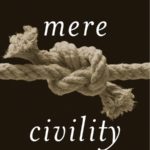Podcast: Play in new window | Download (Duration: 58:02 — 76.2MB)
 Today, politicians and intellectuals warn that we face a crisis of civility and a veritable war of words polluting our public sphere. In liberal democracies committed to tolerating diversity as well as active, often heated disagreement, the loss of this conversational virtue appears critical. But is civility really a virtue? Or is it, as critics claim, a covert demand for conformity that silences dissent?
Today, politicians and intellectuals warn that we face a crisis of civility and a veritable war of words polluting our public sphere. In liberal democracies committed to tolerating diversity as well as active, often heated disagreement, the loss of this conversational virtue appears critical. But is civility really a virtue? Or is it, as critics claim, a covert demand for conformity that silences dissent?
For this program we’ll highlight the life and example of 17th century Puritan Roger Williams. His “mere civility” was a radical notion: if you expect to be able to evangelize (and this was his primary concern) the you must allow others the same opportunity, no matter how much you disagree with them, even if you abhor their ways and believe they will surely spend eternity in hellfire.
Williams was expelled by the leaders from the colony of Massachusetts because local officials thought that he was spreading “new and dangerous ideas” to his congregants (time and again, and after promising always to desist), and he fled the Massachusetts colony under the threat of impending arrest and shipment to an English prison. He began the settlement of Providence Plantation in 1636 as a refuge offering freedom of conscience and is known as the founder of Rhode Island. He is perhaps best remembered as the originator of the principle of separation of church and state (found in his 1644 book The Bloudy Tenent of Persecution, for Cause of Conscience), but might deserve as much attention for his 1643 work A Key into the Language of America, describing the American Indian languages in New England in the 17th century, largely Narragansett, an Algonquian language.
GUEST
 Teresa Bejan is Associate Professor of Political Theory in the Department of Politics and International Relations at the University of Oxford and a Fellow of Oriel College. Her new book, Mere Civility: Disagreement and the Limits of Toleration, sheds light on our predicament and the impasse between “civilitarians” and their opponents by examining early modern debates about religious toleration. As concerns about uncivil disagreement achieved new prominence after the Reformation, seventeenth-century figures as different as Roger Williams, Thomas Hobbes, and John Locke could agree that some restraint on the war of words would be necessary. But they recognized that the prosecution of incivility was often difficult to distinguish from persecution.
Teresa Bejan is Associate Professor of Political Theory in the Department of Politics and International Relations at the University of Oxford and a Fellow of Oriel College. Her new book, Mere Civility: Disagreement and the Limits of Toleration, sheds light on our predicament and the impasse between “civilitarians” and their opponents by examining early modern debates about religious toleration. As concerns about uncivil disagreement achieved new prominence after the Reformation, seventeenth-century figures as different as Roger Williams, Thomas Hobbes, and John Locke could agree that some restraint on the war of words would be necessary. But they recognized that the prosecution of incivility was often difficult to distinguish from persecution.
RELATED
“You don’t have to be nice to political opponents. But you do have to talk to them” by Teresa Bejan
“Acknowledging Equality,” the seventh Balzan-Skinner lecture and symposium with Balzan-Skinner Fellow Dr. Teresa Bejan (video)
‘Bell Curve’ author attacked by protesters at Middlebury College
MUSIC
“Don’t Let’s Be Mean to the Germans” by Noël Coward
“Like a Song” by U2
“(What’s So Funny ‘Bout) Peace Love and Understanding” by Elvis Costello
NEXT UP
 Cuba in Africa
Cuba in Africa
We’re joined by Piero Gleijeses whose book, Conflicting Missions: Havana, Washington, and Africa, 1959-1976, “bluntly contradicts the Congressional testimony of the era and the memoirs of Henry A. Kissinger.” The work sheds new light on U.S. foreign policy and CIA covert operations and revolutionizes our view of Cuba’s international role, challenges conventional U.S. beliefs about the influence of the Soviet Union in directing Cuba’s actions in Africa, and provides, for the first time ever, a look from the inside at Cuba’s foreign policy during the Cold War.
CREDITS
Producer & Host: Doug Storm
Assistant Producer: Rob Schoon
Board Engineer: Rob Schoon
Executive Producer: Joe Crawford
 WFHB Bloomington Community Radio
WFHB Bloomington Community Radio


